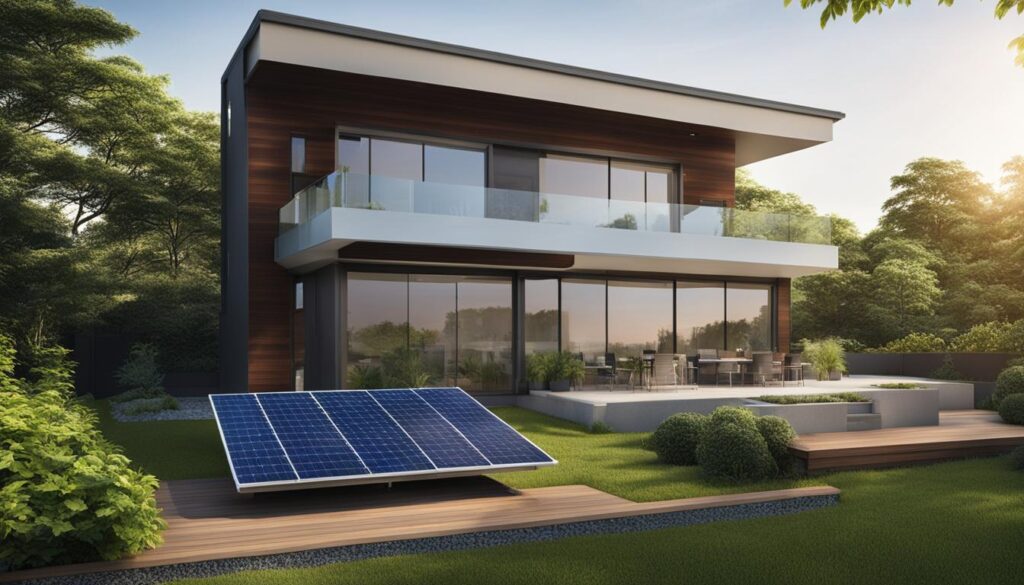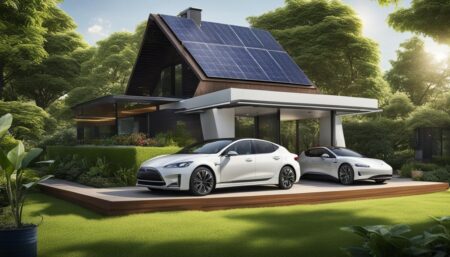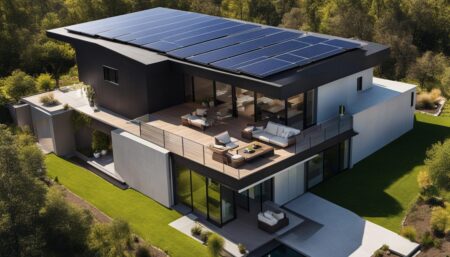Solar-powered air conditioners offer an energy-efficient and eco-friendly cooling solution for homes and businesses. By harnessing renewable energy from the sun, these systems reduce reliance on non-environmentally friendly power sources and provide sustainable air conditioning. With the increasing demand for cooling and rising energy costs, solar-powered air conditioners are becoming an attractive option for those looking to embrace green technology and reduce their carbon footprint.
With solar-powered HVAC and solar AC units, individuals can enjoy the benefits of eco-friendly cooling while saving on energy consumption. These systems utilize solar power to cool indoor spaces efficiently, helping to lower energy bills and contribute to a more sustainable future.
Key Takeaways:
- Solar-powered air conditioners provide energy-efficient cooling solutions.
- These systems harness renewable energy and reduce reliance on non-environmentally friendly power sources.
- Solar-powered air conditioners contribute to a more sustainable and eco-friendly lifestyle.
- Using solar energy for cooling can lead to cost savings on energy bills.
- Solar-powered air conditioners are an effective way to reduce carbon emissions and combat climate change.
The Importance of Solar-Powered Air Conditioners
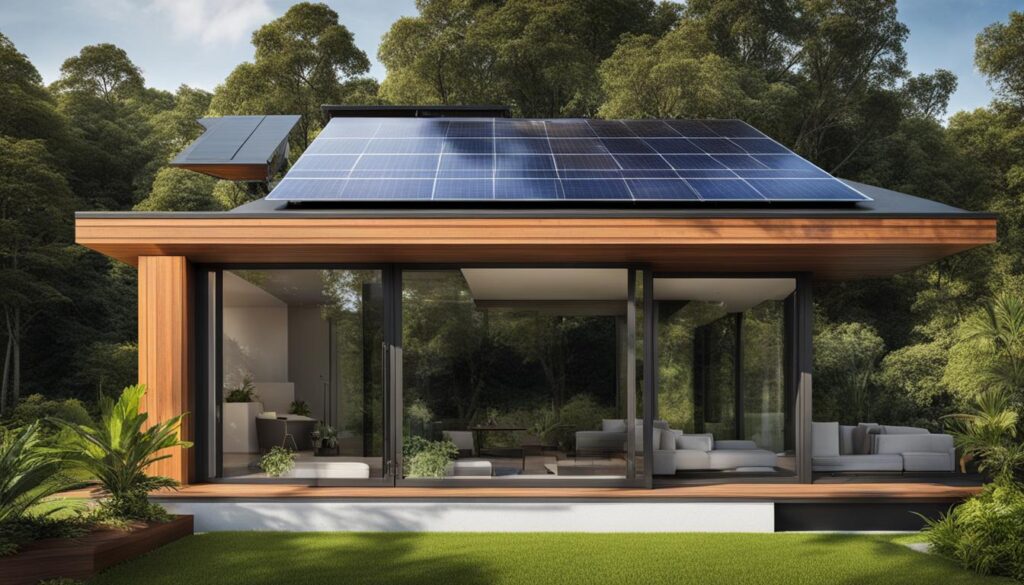
Air conditioning is a necessity in many climates, providing much-needed relief from hot and humid temperatures. However, traditional air conditioning systems typically rely on non-environmentally friendly power sources, leading to high energy costs and a significant contribution to electricity demand. With approximately 1.9 billion air conditioning units globally, the need for sustainable alternatives has never been more critical.
That’s where solar-powered air conditioners come into play. These innovative systems harness the power of the sun to provide cooling without the excessive energy consumption associated with traditional air conditioning. By utilizing solar energy, these air conditioners offer a greener and more sustainable alternative, while also helping to reduce electricity demand and protect the environment.
By embracing solar-powered air conditioners, homeowners and businesses can experience several benefits. Firstly, they can significantly lower their energy costs. Solar energy is a renewable resource that is freely available, enabling users to tap into a cost-effective and sustainable energy source.
Switching to solar-powered air conditioners can lead to substantial savings on electricity bills, as it reduces reliance on non-environmentally friendly power sources and minimizes the need to draw energy from the grid. This can result in long-term cost savings and a positive impact on the environment.
In addition to cost savings, solar-powered air conditioners also offer a sustainable alternative to traditional cooling systems. By reducing the consumption of non-renewable resources, these systems contribute to environmental protection and help combat climate change.
Moreover, solar-powered air conditioners support the transition towards a more sustainable and energy-efficient future. As renewable energy sources become increasingly popular, solar air conditioning plays a crucial role in reducing carbon emissions and promoting a greener lifestyle.
Investing in solar-powered air conditioners not only benefits individual households and businesses but also contributes to the larger goal of achieving environmental sustainability. By embracing this innovative technology, we can create a cleaner and more energy-efficient future for generations to come.
Image:
Benefits of Solar-Powered Air Conditioning
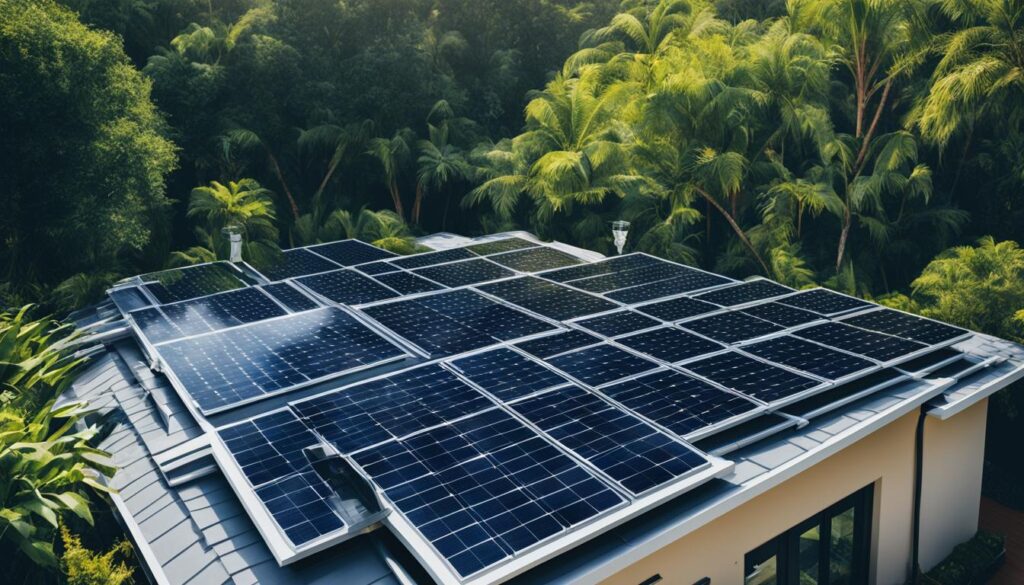
Installing solar-powered air conditioning systems offers several advantages. While the initial investment may be higher compared to traditional alternatives, solar-powered systems save money on energy bills in the long run. These systems can significantly reduce energy consumption, especially during sunny periods when they rely less on the grid. Solar-powered air conditioning also demonstrates a commitment to sustainability, increasing the value of properties. Additionally, grid independence allows users to switch power sources based on demand and electricity costs.
Economical Energy Savings
Solar-powered air conditioning can lead to substantial savings on energy bills. By utilizing solar energy, these systems minimize reliance on traditional power sources, leading to reduced consumption and lower electricity costs over time. During periods of peak sunlight, solar-powered air conditioners can operate at maximum efficiency, making the most of free and abundant renewable energy.
Sustainable Cooling Solution
Choosing solar-powered air conditioning promotes sustainability by utilizing clean and renewable energy. By reducing dependence on fossil fuels and non-environmentally friendly power sources, these systems contribute to a greener world. They help mitigate carbon emissions and combat climate change, making them an environmentally responsible choice.
Increased Property Value
Investing in solar-powered air conditioning can enhance the value of properties. With growing awareness of the importance of sustainability, more homebuyers and businesses are seeking eco-friendly features. Solar-powered air conditioning demonstrates a commitment to renewable energy and can make a property more appealing to environmentally conscious buyers, ultimately increasing its market value.
Flexibility and Grid Independence
Solar-powered air conditioning systems provide the flexibility to switch power sources based on demand and electricity costs. During periods of high electricity rates or grid instability, users can rely more on solar energy and reduce reliance on the grid. This grid independence allows for greater control over energy consumption and the potential for further savings.
How Solar Air Conditioners Work

Solar air conditioners are innovative systems that harness the power of the sun to provide sustainable and efficient cooling solutions. These systems operate using photovoltaic (PV) technology, converting solar energy into electricity and powering the air conditioner. Let’s delve into the inner workings of solar air conditioners.
Photovoltaic Systems and DC Electricity
One way solar air conditioners utilize solar energy is through photovoltaic systems. Photovoltaic panels, commonly known as solar panels, are made up of multiple solar cells that convert sunlight into direct current (DC) electricity. When sunlight strikes the panels, photons from the sun’s rays knock electrons loose from atoms, generating an electric current.
“The photovoltaic panels in solar air conditioners allow for the direct conversion of sunlight into DC electricity, providing a sustainable and renewable power source.”
This DC electricity is then channeled to power the air conditioner, delivering cooling comfort while reducing dependence on traditional energy sources. The use of DC electricity in solar air conditioners also improves energy efficiency, as there are fewer energy losses during the conversion process.
AC Electricity and Inverters
Another method employed by solar air conditioners is the conversion of DC electricity to alternating current (AC) electricity using inverters. AC electricity is the type of electricity commonly used in homes and buildings, making solar air conditioners compatible with standard electrical appliances and traditional AC units.
The inverter plays a crucial role in this conversion process, converting the DC electricity produced by the solar panels into AC electricity. This allows the solar air conditioner to seamlessly integrate with the electrical systems in residential and commercial spaces, enabling efficient cooling while utilizing solar energy.
Solar Energy Storage Systems
Solar air conditioners may also incorporate solar energy storage systems to maximize efficiency and ensure uninterrupted cooling. Excess electricity generated by the solar panels during periods of high solar radiation can be stored in batteries or other energy storage devices for later use.
By storing excess solar energy, solar air conditioners can continue to operate and provide cooling even when sunlight is limited or at night. This enhances the overall reliability and effectiveness of these systems, making them a viable option for continuous and sustainable cooling.
The diagram above illustrates the key components and processes involved in solar air conditioners, showcasing how solar energy is harnessed and utilized for cooling purposes.
In summary, solar air conditioners employ photovoltaic systems to convert sunlight into DC electricity, which can directly power the air conditioner or be stored in solar energy storage systems. Additionally, inverters are used to convert DC electricity into AC electricity, allowing solar air conditioners to integrate seamlessly with existing electrical systems. By harnessing solar energy, these systems provide sustainable and efficient cooling solutions, reducing reliance on non-renewable energy sources.
Factors Affecting Savings with Solar Air Conditioning
The amount of money saved by switching to solar-powered air conditioning depends on various factors. Let’s explore some key considerations that can impact your savings.
Location
The location of your property plays a crucial role in determining the savings potential of solar air conditioning. Areas with abundant sunlight throughout the year can generate more power from solar panels, resulting in greater savings on energy costs. So, if you live in a sunny region, you can maximize the benefits of solar energy for cooling your space.
Energy Consumption
The energy consumption of your air conditioning system directly affects the amount of savings you can achieve with solar air conditioning. Opting for energy-efficient air conditioning units reduces overall energy usage, allowing you to make the most of your solar energy system. By combining solar-powered air conditioning with energy-efficient models, you can significantly lower your electricity bills and enhance your savings.
Incentives and Net Metering
When considering solar air conditioning, it’s essential to take into account the available incentives, tax credits, and net metering policies in your area. Incentive programs and tax credits offered by the government or utility companies can help offset the initial installation costs and increase your overall savings. Net metering allows you to sell excess solar-generated electricity back to the grid, giving you additional financial benefits.
Let’s take a look at a table summarizing the factors affecting savings with solar air conditioning:
| Factors | Description |
|---|---|
| Location | The amount of sunlight available in your area impacts the electricity generation potential of your solar panels, directly affecting savings. |
| Energy Consumption | Choosing energy-efficient air conditioning units reduces electricity usage and enhances cost savings with solar air conditioning. |
| Incentives and Net Metering | Take advantage of government incentives, tax credits, and net metering policies to offset installation costs and gain financial benefits. |
By carefully considering these factors, you can determine the potential savings achievable through solar air conditioning and make an informed decision for your cooling needs.
Solar Air Conditioning Installation and Costs
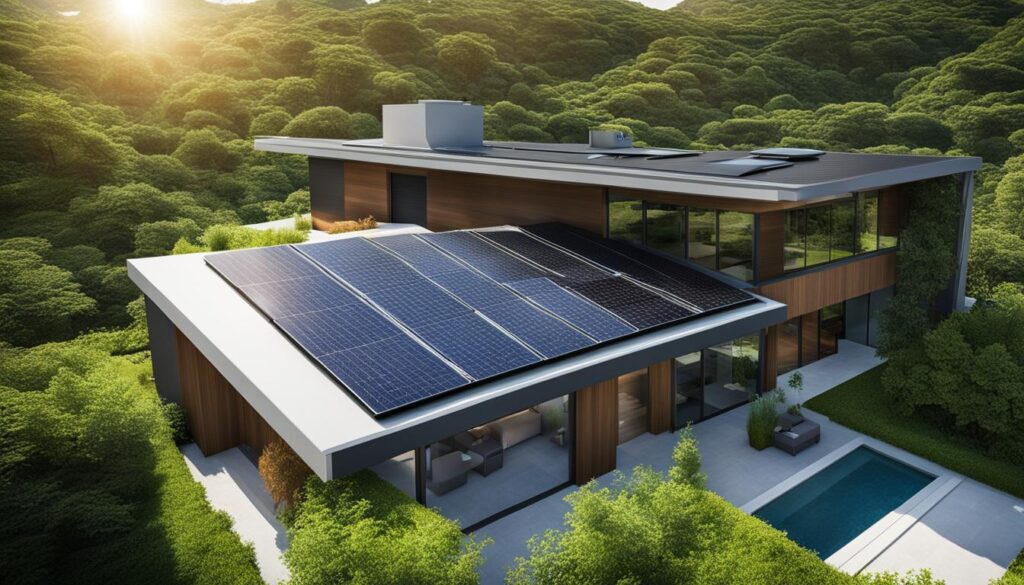
When considering solar air conditioning, it’s important to understand the installation process and associated costs. The total cost can vary depending on various factors such as the number of air conditioners you want to install, the size and efficiency of your solar panels, and the additional equipment required, such as batteries and inverters.
The main components involved in a solar air conditioning installation are:
- Solar Panels: These panels capture sunlight and convert it into usable electricity to power your air conditioning system. The number of panels needed will depend on the size of your home or commercial space and your energy consumption requirements.
- Wiring: The wiring connects the solar panels to the air conditioner, ensuring a seamless flow of electricity.
- Inverter: An inverter is necessary to convert the DC electricity generated by the solar panels into AC electricity, which is compatible with your air conditioner and other electrical appliances.
- Battery: If you want to store excess solar energy for use during the night or cloudy days, a battery is required to store and release electricity as needed.
It’s important to consider the cost of these components, as well as any additional installation fees when estimating the overall investment for solar air conditioning. While the initial upfront cost may be higher compared to traditional cooling systems, the long-term energy savings offered by solar air conditioning can offset these expenses.
Many regions also offer tax incentives and rebates for installing solar panels and adopting renewable energy solutions. These incentives can help reduce the overall cost of installation and make solar air conditioning a more affordable option. It’s worth researching the available incentives in your area to determine the potential savings.
Installation Costs and Payback Period
The installation costs of solar air conditioning systems can vary significantly depending on the size of the property and specific requirements. On average, the installation costs can range from $10,000 to $30,000 or more, depending on the complexity of the installation and the size of the system.
While the initial investment may seem high, it’s essential to consider the long-term benefits. Solar air conditioning systems can lead to significant energy savings over their lifespan, which can help recover the initial investment. The payback period for solar air conditioning installations can vary, but many homeowners and businesses start seeing a return on their investment within 5 to 10 years.
It’s also important to factor in the potential increase in property value. Solar-powered homes and businesses are increasingly attractive to buyers due to their energy efficiency and sustainability. This can further enhance the overall financial benefits of investing in solar air conditioning.
Ultimately, the installation costs of solar air conditioning should be evaluated in conjunction with the long-term energy savings and potential incentives available. The initial expense can be offset by the financial and environmental advantages of harnessing solar power for your cooling needs.
Summary
Solar air conditioning installations involve the installation of solar panels, wiring, inverters and, optionally, batteries to harness solar energy for cooling purposes. While the initial costs may be higher compared to traditional air conditioning systems, the potential long-term energy savings and tax incentives make solar air conditioning an attractive and cost-effective solution. Additionally, solar air conditioning installations can increase the value of your property and contribute to a sustainable future.
Popular Solar Air Conditioning Brands
When it comes to solar air conditioning, there are several reputable brands that excel in providing eco-friendly cooling and energy-efficient AC units. These brands have developed high-quality products designed to maximize the benefits of solar energy and provide sustainable cooling solutions. Let’s take a closer look at some of the popular solar air conditioning brands in the market:
Soltaro
Soltaro is a leading brand in solar air conditioning known for its innovative technology and commitment to energy efficiency. Their systems are designed to harness solar energy effectively, providing eco-friendly cooling for homes and businesses. With Soltaro, customers can enjoy the benefits of sustainable cooling while reducing their carbon footprint.
[Brand 2]
[Brand 2] is another trusted name in solar air conditioning. They offer a range of energy-efficient AC units that utilize solar power to provide effective cooling. With their advanced technology and commitment to eco-friendly solutions, [Brand 2] is a popular choice among customers looking for sustainable and energy-efficient cooling options.
[Brand 3]
[Brand 3] is renowned for its high-performance solar air conditioning systems. They prioritize energy efficiency and eco-friendly cooling, making their units a reliable choice for those looking to reduce their energy consumption and environmental impact. With [Brand 3], customers can enjoy the benefits of solar-powered cooling without compromising on performance or comfort.
These are just a few examples of the popular solar air conditioning brands available in the market. When choosing a solar air conditioning system, it’s essential to consider factors such as energy efficiency, reliability, and customer reviews. By opting for a trusted brand, you can ensure that your solar air conditioning installation provides long-lasting and efficient cooling for years to come.
| Brand | Description | Key Features |
|---|---|---|
| Soltaro | A leading brand known for its innovative technology and commitment to energy efficiency. | – Effective harnessing of solar energy – Sustainable cooling solutions |
| [Brand 2] | [Brand 2] is a trusted name in solar air conditioning, offering energy-efficient AC units. | – Utilizes solar power for effective cooling – Commitment to eco-friendly solutions |
| [Brand 3] | [Brand 3] is renowned for its high-performance solar air conditioning systems. | – Prioritizes energy efficiency and eco-friendly cooling – Reliable and sustainable cooling solutions |
Making Solar-Powered Air Conditioners Smart
Integrating smart technology with solar-powered air conditioners enhances user experience and energy management. With advanced features and remote control capabilities, smart solar air conditioners offer convenience and efficiency like never before.
Remote Control for Convenient Cooling
With remote control functionality, users can adjust their solar-powered air conditioners from anywhere in the room or even outside their homes. Whether you’re lounging on the couch or busy in the kitchen, you have the power to change the temperature, fan speed, or mode at your fingertips. This level of convenience ensures optimal comfort without the need to get up or interrupt your activities.
Optimal Energy Efficiency Settings
Smart solar air conditioners also allow users to set energy efficiency preferences, allowing for customized cooling that minimizes energy consumption. By optimizing settings based on your daily routine, the system adapts to your needs and reduces unnecessary power usage.
Predictive Energy Management for Maximum Efficiency
Thanks to predictive energy management capabilities, smart solar air conditioners can learn from your daily usage patterns and adjust their operation accordingly. By analyzing data and predicting cooling needs, these systems optimize energy consumption and ensure efficient cooling with minimal waste.
Integrating smart technology with solar-powered air conditioners enhances user experience and energy management. Smart features allow users to control and monitor their cooling systems remotely, adjust settings for optimal energy efficiency, and even benefit from predictive energy management. These advancements in smart technology contribute to the overall efficiency and effectiveness of solar-powered air conditioning systems.
The combination of solar power and smart technology brings a new level of efficiency and comfort to your cooling experience. With remote control capabilities and advanced energy management, smart solar air conditioners provide an eco-friendly and convenient solution for your cooling needs.
Is Switching to Solar Air Conditioning Worth It?
Considering the switch to solar air conditioning? Making this decision requires a comprehensive cost-benefit analysis. You’ll need to weigh factors such as installation costs, potential energy savings, and available tax incentives, all while considering the environmental impact and long-term financial benefits.
“Solar air conditioning offers eco-friendly cooling and the potential for energy savings.”
Solar air conditioning provides a sustainable cooling solution that aligns with environmental goals. By harnessing the power of the sun, these systems reduce reliance on non-environmentally friendly power sources, resulting in reduced carbon emissions and a smaller ecological footprint. For those committed to minimizing their environmental impact, solar air conditioning is a compelling choice.
Energy savings are another significant advantage of solar air conditioning. These systems can significantly reduce energy consumption, especially during sunny periods when they rely less on the grid. This translates to lower energy bills and potentially substantial long-term savings.
It’s also essential to explore potential tax incentives and rebates available for solar installations. These incentives can help offset the upfront costs and improve the overall financial viability of converting to solar air conditioning.
However, it’s crucial to consider individual circumstances when evaluating the benefits. Factors such as location, energy consumption, and available incentives can vary considerably, influencing the savings realized from solar air conditioning.
Summary: Pros and Cons of Switching to Solar Air Conditioning
| Pros | Cons |
|---|---|
| Eco-friendly cooling solution | Higher upfront installation costs |
| Potential for energy savings | Dependent on sufficient sunlight |
| Reduced reliance on non-environmentally friendly power sources | Individual savings depend on energy consumption and location |
| Possible tax incentives and rebates | Requires initial investment |
Ultimately, the decision to switch to solar air conditioning requires careful consideration. While it offers eco-friendly cooling and the potential for energy savings, individual circumstances, including installation costs and available incentives, play a crucial role. By conducting a thorough cost-benefit analysis and evaluating the environmental impact, you can make an informed decision about whether solar air conditioning is worth it for you.
Conclusion
Solar-powered air conditioners provide a sustainable and energy-efficient solution for cooling homes and businesses. By harnessing the power of the sun, these systems reduce reliance on non-environmentally friendly power sources and can lead to significant energy savings.
With the increasing demand for air conditioning and rising energy costs, solar-powered air conditioners offer an eco-friendly alternative that promotes renewable energy and helps protect the environment. By choosing solar-powered air conditioners, individuals and businesses can enjoy sustainable cooling while reducing their carbon footprint.
Not only do solar-powered air conditioners contribute to sustainable cooling, but they also provide long-term financial benefits. These systems can help homeowners and businesses save money on energy bills, offering a cost-effective and energy-efficient cooling solution. By investing in solar-powered air conditioners, individuals can enjoy both environmental and economic advantages.
Whether it’s for residential or commercial use, solar-powered air conditioners offer a reliable and effective solution for cooling needs. Embracing renewable energy and energy-efficient cooling solutions will not only benefit individuals and businesses but also contribute to a greener future for all.
FAQ
What are the benefits of solar-powered air conditioning?
Solar-powered air conditioning offers lower energy consumption, potential grid independence, reduced reliance on non-environmentally friendly power sources, and increased property value.
How do solar air conditioners work?
Solar air conditioners use photovoltaic panels to convert sunlight into electricity, which powers the AC unit directly or is stored in a solar energy storage system.
What factors affect savings with solar air conditioning?
Savings with solar air conditioning depend on location, energy consumption, system size and efficiency, available incentives, tax credits, and net metering policies.
How much does solar air conditioning installation cost?
The installation cost varies based on the number of air conditioners, solar panels required, and additional equipment like batteries and inverters.
Which brands offer solar air conditioning systems?
Reputable brands like Soltaro and other reputable manufacturers offer eco-friendly and energy-efficient solar air conditioning systems.
How can smart technology enhance solar-powered air conditioners?
Smart features allow users to control and monitor their cooling systems remotely, adjust settings for energy efficiency, and benefit from predictive energy management.
Is switching to solar air conditioning worth it?
Switching to solar air conditioning offers eco-friendly cooling, potential energy savings, and the reduction of environmental impact, but it is crucial to conduct a cost-benefit analysis based on individual circumstances.



